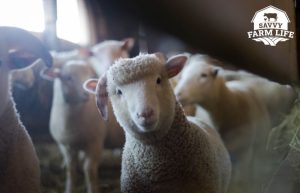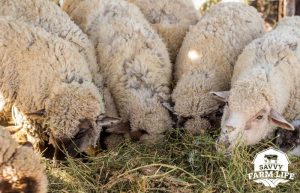How Much Grain Should I Feed My Sheep a Day

How Much Do You Need to Feed Your Sheep?
If you are new to raising sheep, one of the most important subjects you will need to dive into is feeding your sheep. While it is important to know what (and what not) to feed your sheep, it is equally important to know how much to feed your sheep.
How much do sheep eat?The average sheep will consume 2-3% of her body weight in hay per day. While pasture or hay is sufficient to meet the dietary needs of most sheep, a grain supplement may also be necessary on occasion, in the amount of approximately .5-1.5% of the animal's body weight per day. These amounts will vary according to the stage of life the sheep is in – for example, a ram will require a lower percentage of feed than a pregnant ewe.
You are what you eat; this goes for sheep just as it goes for humans! Making sure your sheep gets adequate access to the right kind of food can ensure their health. To learn more about feeding your sheep, keep reading!
Which Is Better For Your Sheep: Pasture Or Hay?
The best way to raise sheep is on pasture. If you have adequate pasture available for your sheep, you may not need to supplement with anything at all, other than a good sheep-specific mineral formula. Sheep may spend up to 12 hours per day grazing, and should be able to self-regulate while on pasture – in other words, there is no need to limit grazing for your sheep.
Not everyone has enough pasture to meet the nutritional needs of a flock. If that is the case, you will need to provide hay twice per day for your sheep. Keep in mind that sheep will not eat hay that has been trampled, urinated, and stepped on – in order to reduce waste, it would be beneficial to purchase a hay feeder that will keep the hay up off of the ground. Just make sure that you purchase (or build) a hay feeder meant for sheep, as hay feeders meant for larger animals may not work.
To learn about how much land you need to support your sheep flock, visit my article How Many Sheep Should You Have Per Acre? Essential Guide.
How Much Hay To Feed Your Sheep
How much hay you feed your sheep will depend on a few different factors. One is the quality of hay. The higher the quality of the hay, the less you will need to provide. For both the health benefits and the reduction of (monetary and food) waste, you will want to provide a high-quality hay for your sheep. The other factor that comes into play is the life stage of your sheep – for example, a lactating ewe will require more hay than a ewe that isn't pregnant.
You will feed about 2-3% of the sheep's body weight in hay daily for adult ewes and rams, breeding ewes and rams, and for ewes in the early period of gestation. This is the amount required to maintain the sheep's body weight.
This means that for maintenance feeding, a 200-pound ewe will need at least 4 pounds of hay per day. This comes out to 120 pounds of hay per month, or 1,460 pounds of hay per year. In most areas, you can expect to pay anywhere from $3 – $15 for a 50-pound bale of hay. In financial terms, this means that you can expect to spend at around $450 per year in hay for one 200-pound sheep to maintain the animal's weight. If you have 3 sheep (the absolute minimum you should have to keep a flock), this will equal $1,350 per year in hay.
How Much Hay To Feed Pregnant Sheep
While most sheep will require 2-3% of their body weight in hay each day, (late) pregnancy and lactation require additional protein and calories. If you are new to sheep, you may assume that once your ewe is pregnant, it is time to up the caloric intake. This is not true, and can result in an overweight ewe and problems with the pregnancy. 70% of a sheep's fetal development occurs in the last 4-6 weeks of pregnancy – this means that a ewe should only get the required amount of hay to maintain her weight for the first 14-16 weeks of pregnancy.
During the last 4-6 weeks of pregnancy, you will want to increase a ewe's intake to 3-3.5% of her body weight in hay. For a 200-pound ewe, this means you will increase her hay intake from 4 pounds per day to at least 6 pounds of hay per day. Increase her intake slowly. You can increase her intake by giving her half a pound of additional hay over the course of 4 days. This will allow her body time to adjust and lessen the likelihood that she will develop digestive troubles. You may also elect to simply give her free access to hay throughout the day at this point.
How Much Hay To Feed A Lactating Sheep
 While late pregnancy will require additional nutritional requirements, lactation will require even more. A lactating ewe will need the highest percentage of hay of any other life stage, requiring 3.5 – 5% of a ewe's body weight in hay. This means that a lactating 200-pound ewe will require at least 7 pounds of hay daily.
While late pregnancy will require additional nutritional requirements, lactation will require even more. A lactating ewe will need the highest percentage of hay of any other life stage, requiring 3.5 – 5% of a ewe's body weight in hay. This means that a lactating 200-pound ewe will require at least 7 pounds of hay daily.
Keep in mind that the more lambs a ewe births, the more milk she will need to produce. These percentages are a good rule of thumb to follow when a ewe produces one lamb. If your ewe gives birth to twins (or triplets), you will need to further increase her daily intake.
When a ewe is lactating, even more important that additional calories is the additional protein she will require to produce an adequate quantity of milk. If you do not already provide a high-protein hay, consider switching her (slowly) to a rich hay, like alfalfa.
To learn more about female sheep and their specific needs, visit my article What a Female Sheep is Called & Interesting Female Sheep Facts.
How To Feed Lambs
When a lamb is born, it is important that they begin nursing right away. A ewe produces colostrum for about 24 hours after giving birth, and colostrum is what gives the lamb's immune system a vital boost. Going forward, a lamb requires only the mother's milk for the first 4-6 weeks of life, at which time you may slowly introduce hay into her diet.
You may choose to wean your lambs at a specific age, or you may choose to let the ewe wean her lamb on her own time. While not usually necessary, some shepherds choose to slowly introduce "creep feed" after the first couple of weeks – this is a grain-based feed formulated specially for lambs to give them a solid start.
Feeding Grain To Sheep
While most sheep thrive on pasture or hay alone, there may be a time when you need to supplement one or more of your sheep's diet with a commercially produced feed. You may want to supplement with grain if your sheep are underweight, during late gestation, or while a ewe is lactating. There are many different kinds of commercial feed on the market, and the amount you feed will vary according to the nutrition content of the feed you choose. Most feeds will have a tag on the bag that will indicate how much you should feed your sheep based on its stage of life.
Underfeeding and Overfeeding Sheep
Many health problems that afflict sheep can be attributed to a body condition that is less (or more) than ideal. Overweight sheep are prone to bloat and other diseases, while underweight sheep are more susceptible to parasites. The percentages and amounts listed throughout this post are only guidelines, and you will need to assess the weight of your sheep regularly to ensure that you are providing the right amount of feed.
You can assess your sheep by using body condition scoring. This is a method that uses palpation to determine the health of your sheep. Use your hands to feel the area around the sheep's loin vertebra – the last rib to the hip bone. Give your sheep a score between 0 and 5, with 0 being emaciated and 5 being morbidly obese. As you gain experience with body condition scoring, it will become easier to recognize when your sheep is too thin or too heavy.
How Much To Feed An Underweight Sheep
It is pretty obvious what is needed for an overweight sheep – you will need to feed them less. But how much do you feed an underweight sheep? Feeding your sheep one additional pound of grain daily for 30 days, or one additional pound of hay daily for 60 days, should increase her body condition score by one point. It is important that you do not feed her too much in a short period of time, as this might cause her digestive upset. Increasing her hay or grain intake by one pound per day should achieve positive results within a month or two.
Nutritional Requirements Will Evolve
Your sheep's dietary needs will evolve with the sheep's life stage and age. Make sure that you are regularly assessing your sheep's body condition and health, and adjust his or her intake as needed. This may seem an overwhelming responsibility in the beginning, and you might choose to consult a vet or experienced shepherd for input. As you gain experience however, these assessments will become second nature to you.
What should you do if your sheep aren't eating? Check out my article, Why Is My Sheep Not Eating? Common Causes & Solutions.
Source: https://savvyfarmlife.com/how-much-do-sheep-eat/
0 Response to "How Much Grain Should I Feed My Sheep a Day"
Post a Comment